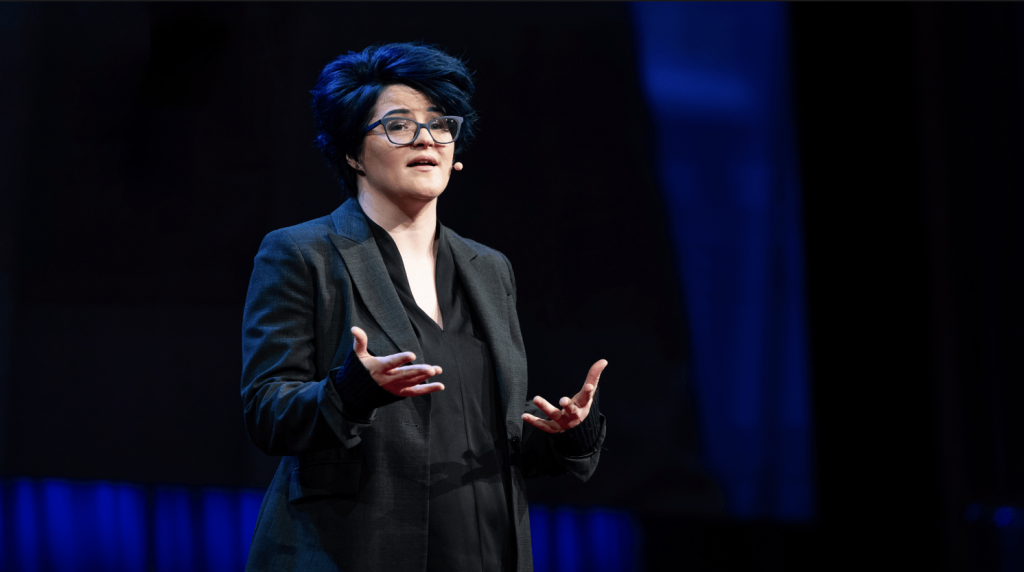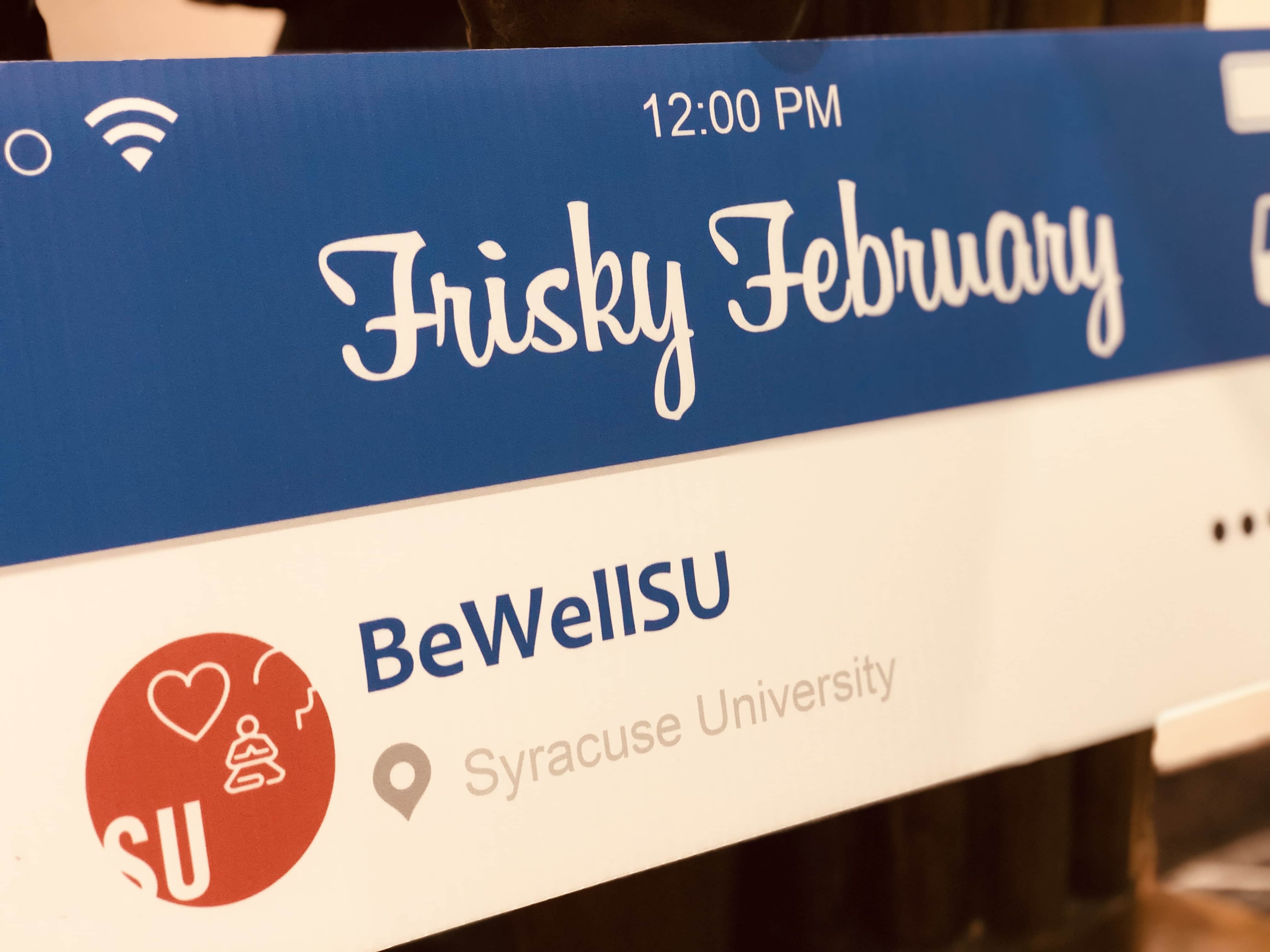5 science-based sex lessons from Emily Nagoski’s ‘Come As You Are’
5 science-based sex secrets from Dr. Emily Nagoski

Try saying the words “frisky February” out loud. Does it feel awkward? Or maybe it feels frisky?
That’s precisely the point of Syracuse University’s “Frisky February” Sexual Health Awareness Month programs, hosted by the Office of Health Promotion. There needs to be more awkward discussions about sex in order to drive more awareness to the subject.
Around 50 SU students sat in Maxwell Auditorium on Wednesday night, waiting to hear what Emily Nagoski, sex educator and writer of The New York Times best-selling book Come as You Are: The Surprising New Science That Will Transform Your Sex Life, had to say about sex.
“Emily helps raise awareness about the facts and science, instead of what culture might say that might not be necessarily correct,” says biology sophomore Alyssa Cregan, a member of PEERHS (Peer Educator Encouraging Healthy Relationships and Sexuality.) “So by learning facts and the science, then you know the truth and can be empowered by it.”
Nagoski uses evidence-based approaches to talk about sexual wellbeing in a way that’s refreshing and real — but most importantly, she shares perspectives on sex that she believes can reduce stress and transform your sex life.
A couple minutes in, she asks the college crowd: What are some things that can get in the way of having good sex?
“Shame,” a voice says from the crowd. A slew of ugly words follows; “Anxiety.” “Worry.” “Depression.” “Stress.”
Nagoski looks unsurprised. In her 25 years as a sex educator, she’s discovered these emotions connected to college students’ sexuality before. She recounts that at end of a semester of teaching a class at Smith College, she’d asked her students to each write on a piece of paper one thing they learned from her class. One after another, she read the revelations:
“I’m normal.”
“I’m actually normal?!”
“I can trust my body.”
At a campus where “no-strings-attached” sex is thought of as standard, there’s seemingly a lot of baggage attached. One of the students present, 25-year-old Deana Heitzman from the military visual journalism program, says the positivity Nagoski stands for in her work inspires her to be a sex educator herself.
“Within college, there’s this negativity and stigma surrounding sex,” Heitzman says. “People are so uncomfortable, sheltered, and shamed by their emotions when it comes to sex. Open talks like these improve people’s comfort zone and help people become more accepting of sex and their bodies.”
Here are five eye-opening lessons from the lecture:
Wanting and liking are two different experiences.
You might have heard the saying before, “She says no, but her body says yes.” The scientific term is “arousal non-concordance,” and it explains that even if your body is turned on, it is simply a response, not an honest communicator of your internal experience. Nagoski aptly simplifies the idea with a genius peach analogy:
EN: “If I bite into a moldy, wormy peach, and my mouth waters, are you going to say to me, ‘Oh, you just don’t want to admit how much you like it?’ No, right? When I spit it out and say, ‘That was disgusting,’ you’re going to believe me that it was gross.”
We are all made of all the same parts, organized in different ways.
The anatomy food for thought we all needed to be served, below:
Emily Nagoski: “Every package of genitals is different, but every package of genitals is exactly the same. And I mean that [in a] very literal sense. Once upon a time…at week five in your development as an embryo, we were all the same. And then somewhere around week six, there was a wash of testosterone, and depending on genes and the chemical environment in the womb, your cells responded to that wash of hormones…”
EN: “But before that wash of testosterone, we all had the same stuff. Even now, all have the same stuff but organized in different ways: a fleshy part that’s stretchy where hair grows on it, (vulva; scrotum,) a head, (head of the penis; clitoris) and all this other stuff on the inside. But no two girl packages, or boy packages, or intersex package are the same. Every penis is different from every other penis, every scrotum different from every other scrotum and every labia is different from every other labia. And each one is normal.”
Sex is like tickling, whether you like it or not depends on the context.
EN: “When your brain is in a calm relaxed state, turned on, trusting, it will define anything as erotic. If you’re in a good state of mind, and your special someone tickles you, it feels good. If you are stressed, pissed off, trying to write a paper and your S.O. tickles you, violence will shortly ensue. In order to be in a context that allows your brain to feel like it is in a safe, fun, sexy place — to have the best sex of your life, mental and physical wellbeing affects how much pleasure your enjoy.”
Bottom line: Sexual pleasure is context-dependent. If you’re experiencing difficulties, assess the context.
Learn to turn on the ons, and turn off the offs.
EN: “The process of becoming aroused is a dual process of turning on the ons, and turning off the offs. The first part is a sexual accelerator, and the second part is the sexual gas pedal, the break. The accelerator responds to all the sexually relevant information in the environment and sends the turn-on signal. The break filters the same information and turns off the response if it determines as a potential threat. Most often, when people are struggling, it turns out that the difficulty is not having too little stimulation with the accelerator, (‘like Cosmo will say ‘Well try adding lingerie, try porn, toys…’) But the problem is too much stimulation of the break. Hint: Paying attention to how your body feels during sex is an accelerator; paying attention to how your body might appear absolutely hits the breaks.”
It’s not always easy to fix the breaks. But the ultimate answer and most effective prevention, Nagoski noted, is practicing mindfulness to help your body put the noise in your brain on the back burner. Another evidence-based exercise is standing up to mirror naked, and focusing on writing down everything you see that you like. If done on a consistent daily basis, Nagoski promises miraculous results.
EN: “Each time, you get a little more immune to the external cultural messages and a little more sensitive to the actual miracle that is your body…And you start to recognize, ‘Oh wait—everything I’ve ever been taught, all these cultural messages about my body were just lies to make me feel bad. And if I ignore it, I will have amazing sex. And that would be…. Good! It takes practice, and it takes the decision that it matters to you more to enjoy living in your body than conforming with the external, fictional ideal.”
Pleasure is the measure.
Was it “good?” When it comes down to it, there’s no real science to tell you if you’re doing it right. Nagoski says to put pleasure at the center of your definition of sexual wellbeing, not orgasms.
EN: “Let’s talk about orgasms, shall we? Forty years of research show that about a quarter of women are reliably orgasmic from vaginal stimulation alone. Half of women are sometimes orgasmic, and a third are never or rarely orgasmic from vaginal sex. Five to 10 percent of women will never have an orgasm in their lives. So, which of these women are normal and healthy? All of them!”
EN: “It’s your body, you get to choose what you like. There’s no script of what’s okay and what’s not okay. The only rule is consent. You are normal. If you want to f— your partners armpit, that’s okay. You do you.”
_________________________________________________________________________
As a part of SU’s sexual awareness month, Health Services and Student Association are partnering with the Get Yourself Tested campaign to offer two days of free and confidential STI screenings to students. STI screening days are Feb. 14 and 15 and offered on a first-come, first-served basis from 9 am to 4 pm in the Office of Health Promotion, located at 804 University Ave., Suite 114.






